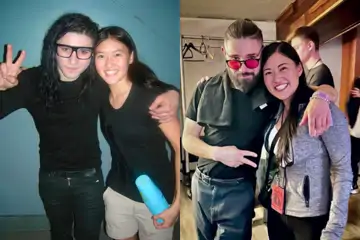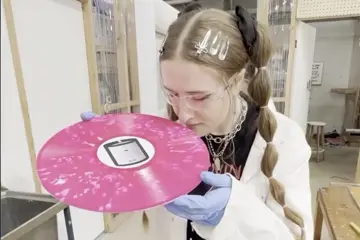“The future is female.” It’s a phrase that has been slapped onto sweatshop-made T-shirts the world over, feminism commodified, but as Vivien Goldman would attest in her BIGSOUND keynote last week in Brisbane - potentially the punkest talk we’ve ever seen - “the time for the female is right now”.
Perhaps not a household name Down Under, over her five-decade career Goldman has established herself as a respected music journalist in the male rock-critic battalion, was a member of The Flying Lizards, had a close working relationship with Bob Marley, and currently works as adjunct professor of Punk and Reggae at New York University earning her the “Professor Of Punk” title.
She stated it was her first trip to the southern hemisphere; a tour following the release of her book, Revenge Of The She-Punks: A Feminist Music History from Poly Styrene to Pussy Riot, aka her effort to give punk’s most incendiary yet ignored insurgents, women, their time in the spotlight. It’s a book she spent two-and-a-half years writing and poured “a whole lotta living” into; a book she was asked to write, something she said sums up the differences in the times we are living through.
A talk punctuated by pauses and podium poses, it was fascinating to watch Goldman’s brain work in real time, barely checking her notes, namechecking local acts like VOIID, Flangipanis and BLUSSH.
Don't miss a beat with our FREE daily newsletter
Not a fan of the term ally - “it implies that we are in a constant state of war” - Goldman did acknowledge the fact that women are under incredible attack and punk’s place as a valid, creative response: “Punk hit and the whole scene changed; all of a sudden I wasn’t alone.” Importantly, she spoke of history’s cyclical nature. “The narrative of this book, which is really about how punk empowered and liberated female artists, it’s not just something stuck in a time-warp from the ‘70s.”
Just as those before us saw a shift in gatekeepers, there has been another “cultural seismic shift”. And as Goldman put it, “When I say cultural gatekeepers, it’s not a question of whether you have a dick or not.”
The first change Goldman pointed to was technology advancement; new tools affording and empowering bands like The Slits and The Raincoats to record in their bedrooms onto cassette.
Goldman also spoke of the rise of indie labels and the power of community in responding to this shift. While the feminist lineage has been disrupted in an industry that “wants new flesh”, Goldman stressed the importance of “assert[ing] an ongoing chain of development” to ensure there was no longer a “disruption of communication between generations”.
"It’s time for affirmative action," she finished. Time to give the work of women an extra push and use culture to create a space where people’s minds can be changed.














